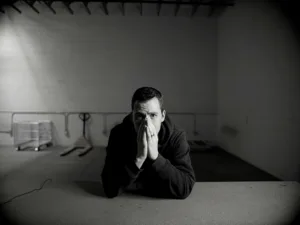Becoming a dad is life-changing. It can bring joy, pride, and purpose. But for many men, it also brings something unexpected: depression. If you’re feeling overwhelmed, irritable, disconnected, or unlike yourself in the months after your child’s birth, you’re not alone. Up to 1 in 10 new fathers experience male postpartum depression (also known as paternal postpartum depression). The actual number may be even higher.
It’s time to talk about it because male postpartum depression is real, treatable, and nothing to be ashamed of. You are not alone; there is support for male postpartum depression.
What Is Male Postpartum Depression?
Male postpartum depression is a nonpsychotic depressive disorder that can develop during the first 12 months after your child is born. Unlike maternal PPD, which usually peaks in the first 4 to 6 weeks, male postpartum depression symptoms tend to show up later, often between 3 to 6 months postpartum. This delayed onset means many men chalk it up to “normal new dad stress” and never seek help.
This condition isn’t about weakness. It’s about your body and brain responding to a major life change, compounded by societal expectations and limited support. The pressure to be the rock, the provider, and the emotional anchor can push even the strongest man to his breaking point. You are not alone, and there is support. “Men often don’t want to admit they’re struggling. Therapy permits them to speak the unspeakable. The earlier we intervene with fathers, the better the outcome for the entire family,” explains Steven Ayers, LCSW at Denver Men’s Therapy.
Can Males Get Postpartum Depression?
Yes. The idea that only mothers experience postpartum depression is outdated and harmful. Men go through hormonal changes too; testosterone levels can drop after a baby’s birth, and the emotional, relational, and financial stressors of fatherhood can be just as intense.
Male postpartum depression is often misunderstood, underdiagnosed, and minimized. That needs to change. Recognizing the symptoms is the first step. “New dads describe rage, disconnection, or anxiety after their baby is born; they’re often surprised to learn these can be signs of depression,” explains Steven Ayers, LCSW
Signs and Symptoms of Male Postpartum Depression
Male postpartum depression symptoms often look different from what people expect. Rather than sadness or crying, you might notice:
Primary Emotional and Behavioral Indicators:
- Anger attacks and irritability: These symptoms often predominate over the sadness typically associated with depression. New dads may experience anger, irritability, or aggression rather than sadness
- Indecisiveness and cognitive impairment: Difficulty making decisions and concentrating on tasks
- Cynicism and negative cognitions: Persistent negative thoughts about fatherhood and family life
- Avoidance behaviors: Deliberate distancing from family responsibilities
- Affective rigidity: Restricted emotional expression and difficulty experiencing positive emotions
- Self-criticism: Excessive self-blame and feelings of inadequacy in the paternal role
Physical Manifestations:
Physical symptoms frequently accompany the psychological aspects of paternal PPD:
- Gastrointestinal disturbances (indigestion, nausea, appetite changes)
- Sleep disruptions beyond those attributable to infant care
- Persistent headaches and unexplained pain
- Changes in weight and eating patterns
Interpersonal and Social Impacts:
- Marital conflict and relationship deterioration
- Difficulty establishing emotional bonds with the infant
- Social withdrawal and isolation
- In severe cases, substance abuse or aggressive behaviors
Why Do Men Experience Postpartum Depression?
There’s no single cause, but several factors increase risk:
External Pressures:
Partner’s Depression: Research consistently identifies maternal postpartum depression as the strongest predictor of paternal PPD. When partners experience depression, fathers often assume additional caregiving responsibilities while simultaneously managing their partner’s emotional needs, creating cumulative stress that increases depression risk.
Male Gender Role Stress (MGRS): Societal expectations regarding masculine identity significantly influence paternal mental health. Traditional gender norms dictate that men should fulfill the “family breadwinner” role while maintaining emotional stoicism. The inability to meet these expectations, particularly given the financial pressures of new parenthood, creates substantial psychological stress.
Social Support Deficits: New fathers frequently experience isolation due to limited paternal support networks. Unlike mothers, who typically have access to various support resources, fathers often lack comparable social structures. When the primary source of support, the partner, is also struggling, this isolation intensifies.
Economic and Occupational Stressors: Financial pressures intensify with a new baby’s arrival. Research links low income, unemployment, and job instability to increased paternal PPD risk. Additionally, limited paternity leave and work-family conflict contribute to psychological distress.
Relationship Dynamics: The transition from dyadic to triadic family structure presents significant challenges. Studies indicate that increased marital conflict correlates with a fivefold greater likelihood of paternal depressive symptoms.
Personal Factors
Psychiatric History: Previous depression or anxiety disorders significantly increase PPD risk. Fathers experiencing antenatal depression show higher rates of postpartum depression, suggesting continuity in perinatal mental health challenges.
Hormonal Fluctuations: Contrary to common belief, fathers experience hormonal changes during their partner’s pregnancy and postpartum period. Decreased testosterone levels and elevated cortisol have been associated with paternal depression risk.
Parenting Experience: First-time fathers demonstrate higher anxiety levels, particularly in the initial postpartum month. Limited parenting knowledge and overwhelming lifestyle changes contribute to increased vulnerability.
Sleep Deprivation: Infant sleep problems strongly correlate with paternal depression, particularly among first-time fathers. Chronic sleep disruption affects emotional regulation and cognitive function.
Male Versus Female Postpartum Depression
Differences in male and female postpartum depression.
Feature | Maternal Postpartum Depression (PPD) | Paternal Postpartum Depression (PPD) |
Symptom Presentation | Commonly exhibits sadness, guilt, tearfulness, and withdrawal. | More frequently displays anger, irritability, risk-taking behaviors, and detachment. |
Onset Patterns | Typically emerges within 4-6 weeks postpartum. | Develops gradually over the first year, with peak prevalence at 3-6 months. |
Help-Seeking Behaviors | More likely to seek professional help, though still underreported. | Societal stigma often normalizes symptoms, leading to under-diagnosis and under-treatment. |
Impact on Family Systems
The effects of untreated male postpartum depression extend beyond the individual, creating cascading impacts throughout the family unit.
Infant Development: Research demonstrates that infants of depressed fathers exhibit higher distress levels, including excessive crying, feeding difficulties, and sleep disruptions. These early experiences can impact long-term emotional and behavioral development.
Child Outcomes: Children exposed to paternal depression face increased risks of emotional and behavioral problems that may persist into adolescence and adulthood. These include heightened aggression, anxiety, and social withdrawal.
Relationship Quality: PPD significantly strains marital relationships, creating cycles of conflict and emotional disconnection that further exacerbate depressive symptoms.
Treatment Approaches and Interventions
Effective treatment for postpartum depression male mental health concerns requires comprehensive, male-specific approaches. Therapy with a licensed professional therapist can help treat postpartum depression.
Psychotherapeutic Interventions
Cognitive-Behavioral Therapy (CBT): This evidence-based approach helps fathers identify and modify negative thought patterns contributing to depression. CBT provides practical strategies for managing symptoms and improving coping mechanisms.
Support Groups: Peer support groups offers unique benefits, providing validation and reducing isolation through shared experiences with other fathers facing similar challenges.
Couples Therapy: Addressing relationship dynamics while navigating parenthood can improve both paternal mental health and family functioning.
Pharmacological Treatment
Antidepressant medications, particularly selective serotonin reuptake inhibitors (SSRIs), may be prescribed for moderate to severe cases. Medical supervision ensures appropriate medication selection and monitoring.
Lifestyle Interventions
Evidence supports several non-pharmacological approaches:
- Regular physical exercise for mood regulation
- Mindfulness and stress-reduction techniques
- Structured sleep hygiene practices
- Social connection and community engagement
Advocate for Yourself
Current screening tools often miss male postpartum depression symptoms because they’re designed for women. Be direct with healthcare providers about what you’re experiencing, even if it doesn’t fit the “typical” depression mold.
The Bottom Line: You’re Not Alone, and It’s Not Your Fault
Having a postpartum disorder doesn’t make you weak, ungrateful, or a bad father. It doesn’t mean you don’t deserve your children or can’t care for them. It simply means you need support during a challenging life transition, just like 10% (or more) of new fathers worldwide.
Remember:
- Male postpartum depression is a real medical condition, not a character flaw
- Your brain chemistry isn’t under your conscious control
- Getting help models strength and self-care for your children
- Treatment works, and you can feel like yourself again
Take Action Today
If you’re experiencing male postpartum depression symptoms, don’t wait for them to “go away on their own.” The highest rates occur 3-6 months postpartum, but you can seek help at any point during your child’s first year.
Your first step: Reach out to Denver Men’s Therapy. We understand paternal mental health. Tell them specifically that you think you might be experiencing postpartum depression as a father.
Remember: Taking care of your mental health isn’t just about you,it’s about being the father and partner your family needs. You deserve support, understanding, and treatment. Your family deserves a healthy, present dad.
If you’re a new father struggling with depression, anxiety, or other mental health challenges after your baby’s birth, reach out for help today. Contact Denver Men’s Therapy at 720-295-4233 or message us. You’re not alone in this journey.
Frequently Asked Questions
What are the risk factors associated with male postpartum depression?
Risk factors for male postpartum depression include a history of depression, relationship conflicts, lack of social support, financial stress, sleep deprivation, and hormonal changes. Recognizing these factors early can help in timely intervention and support.
How does male postpartum depression differ from female postpartum depression?
Male postpartum depression may manifest as anger, irritability, or escapist behavior rather than sadness. Men might also experience physical symptoms like headaches or digestive issues. Understanding these differences is crucial for accurate recognition and treatment.
How is male postpartum depression diagnosed?
Diagnosing male postpartum depression involves a thorough evaluation by a healthcare provider. The process typically includes assessing symptoms, medical history, and ruling out other potential causes. Seeking professional help is essential for an accurate diagnosis and appropriate treatment plan.
What are some unhealthy ways dads, including new dad, cope with postpartum depression?
Men may resort to unhealthy coping mechanisms such as substance abuse, overworking, withdrawing from relationships, or engaging in risky behaviors. These strategies provide temporary relief but can worsen the condition in the long run. Encouraging healthy coping strategies is vital for recovery.
What therapy options are available for male postpartum depression in Denver?
At Denver Men’s Therapy, we help new Denver dads facing postpartum depression heal, reconnect with loved ones, and create lasting connections with family.






